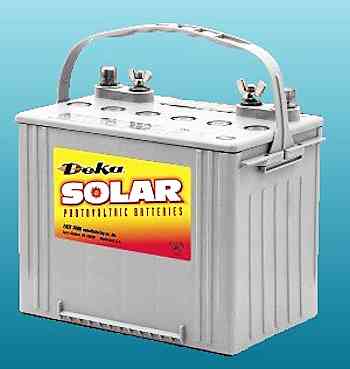By Guest Blogger Clive Rollison
Given Deutsche Bank’s prediction that the solar energy market will reach $5 trillion by 2030, the continued growth of this successful industry depends on a viable solar battery. With Elon Musk’s Tesla, Mercedes-Benz and various startups, all challenging to create an effective solar battery, it only remains to be seen; who will capture the market?
Why are Solar Batteries so important?
So why is an effective solar battery so important to the renewable energy industry? Essentially, solar batteries will enable houses to harvest and store energy generated by solar panels during the day, using it to power up during peak times when generation is low, such as evenings.
Whilst the concept of renewable energy storage may not be new, we are at the beginning of a new era that could revolutionize the way we power our houses, businesses and potentially, the whole planet. In storing energy during off-peak hours of the day, solar batteries will enable houses to run independently of the power grid, with the potential to save us vast amounts of money.

The possibilities of domestic and business solar batteries are astounding. Not only is such cutting-edge technology a great economic investment, it ultimately aims to shift the planet away from dependence on fossil fuels as our main power source. In this sense it could be the defining factor in the United States’ pledge to cut its greenhouse gasses by “26-28% below 2005 levels by 2025”; and similarly, the European Union’s pledge of 40% by 2040. And in addition, the potential impact could be groundbreaking in developing countries, especially in areas that do not have easy access to grid electricity.
Who’s in the market?
Since Elon Musk’s Tesla Motors unveiled plans for their Tesla Powerwall at the end of April, Tesla has generated a wave of excitement across the industry. Declaring itself an “energy innovation company”, Tesla sees itself as a critical player in the mission to “enable a zero emission power generation”.
A wall-mounted lithium-ion electric battery for homes and small businesses, the Powerwall will measure in at 33 inches wide and 51 inches tall. It comes in either a 7-kilowatt per hour (kWh) daily cycle model, or a 10 kWh model, which cost $3,000 and $3,500 respectively. Moreover, consumers will be able to stack up to nine Powerwalls, providing up to 90 kWh of energy – some three times more than the average daily electricity consumption of U.S. residential utility customers. Tesla is also developing a higher capacity version designed for utility-scale use – the Powerpack.
Meanwhile, Mercedes-Benz is also making progress in the industry with the announcement of its personal energy cell that holds 2.5 kWh of energy. Similar to the Powerwall that can be stacked to increase output, up to eight of these lithium-ion cells can be combined to hold 20 kWh of energy. Although prices are yet to be announced, Mercedes-Benz has opened an customer interest registration service on their website, though only available at the moment in Germany.
Aside from the aforementioned automobile corporations, various start-ups have had great success in the launching of similar lithium-ion batteries. Most notable is London based start-up Powervault. A product “designed with British people in mind”, the Powervault can store 2-4 kWh, and is priced at £2,000-£2,800 ($3,110 – $4,350). Managing director, Joe Warren, aims to cut the cost to a modest £1,000 ($1,550).
Additionally, Ecotricity is set to trial the ‘Black Box’ energy storage system that will take houses on and off the power grid to avoid peak time usage.
Who will come out on top?
Tesla looks set to dominate a large part of the market with all planned units sold out until mid-2016. It has commissioned the building of the Gigafactory in Nevada, where it aims to produce 500,000 lithium-ion batteries annually, giving Tesla Motors a huge advantage over its competitors.
Despite such ambitions and early success, Tesla faces challenges in sustaining its market position due to the high cost of its product and its availability. This opens great opportunity for its competitors, including start-ups, to control smaller-scale markets. With plans to sell 50,000 units by 2020 through solar installers, it is clear that Powervault has its sights firmly on securing the British market.
With the price of lithium batteries predicted to fall, Deutsche Bank estimates that it could take only another five to ten years before we see wide scale adoption of solar batteries. We are clearly at the beginning of a new era in solar energy. Let’s hope the sun keeps shining!
About The Author
Clive Rollison is passionate about cutting costs for homeowners and businesses through renewable energy technology. His company, Complete Renewables, is the leading installer of solar panels in Essex, UK.
Leave a Reply
You must be logged in to post a comment.